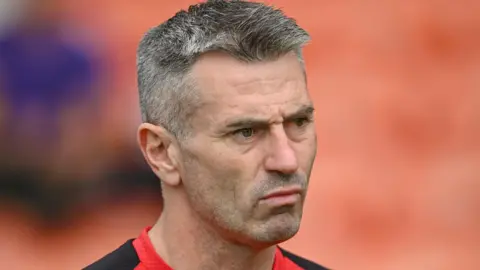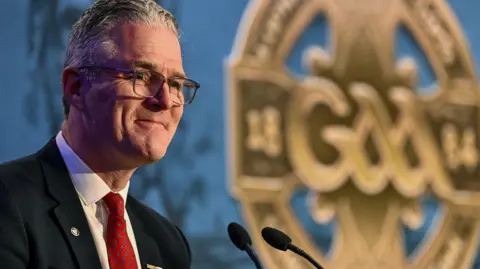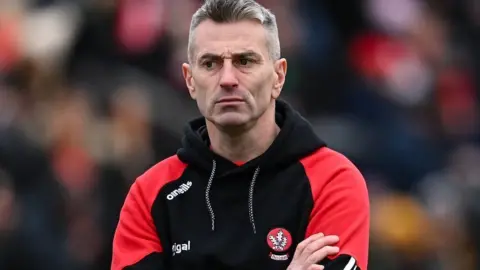How the Rory Gallagher-Jarlath Burns row exposes a deepening GAA divide
 Getty Images
Getty ImagesNew year usually means a fresh start but the opening of 2025 has found the GAA looking at a familiar, and divisive, story.
Rory Gallagher, once one of Gaelic football's most high-profile coaches, has accused the organisation's president Jarlath Burns of sabotaging his career and threatened legal action.
It came after Mr Gallagher was announced as part of the senior management team at Kildare club Naas on Sunday.
However, within 24 hours, he was out again.
The backlash against his appointment was as swift as it was predictable – he has been out of high-profile management since being accused of abuse over a 24-year period by his estranged wife Nicola Gallagher in May 2023.
The accusations, which he has consistently denied, led to him stepping down as Derry county manager that same month.
Less predictable, however, was the role of GAA president Jarlath Burns in Naas' decision.
While the club has not elaborated on what drove the U-turn, it emerged on Monday that Mr Burns made his concerns known to the club directly.
An email sent by him to the Naas chairperson, seen by BBC News NI, warned that Mr Gallagher's appointment would send a "message about the values we uphold and standards we set" and also have implications for the GAA's Game Changer initiative.
In response, Mr Gallagher pointed out prosecutors said he "had no case to answer".
The Public Prosecution Service, in 2023, said it decided not to press charges as there was not enough evidence to provide a reasonable prospect of conviction.
Mr Gallagher added that "social media commentary and controversy now equates to a licence for presidential intervention".
Now, this latest rift in an almost two-year old story is exposing a divide in how the GAA community sees the president's role, particularly as the world largest amateur sporting organisation continues to grapple with the professional demands of the modern age.
Should Jarlath Burns be intervening in club business?
Or is he simply carrying out his role in being protective of the ethos of his organisation and the need to be sensitive to safeguarding concerns?
 Getty Images
Getty ImagesThe president's email was one of hundreds sent to club officials regarding Mr Gallagher's appointment, said Sinéad O'Carroll, editor of news site the Journal and co-host of The 42FM sports podcast.
"The membership has women, camogie players, kids, parents. It's not just about the men's senior footballers and then the public nature of the announcement, the publicity just added to the awareness," said O'Carroll, who also plays camogie at Kildare club Celbridge.
While the GAA's safeguarding of young people is generally strong, clubs ultimately do not have HR departments, she added.
The president's intervention, she said, was partly "to help the club with these processes" and that was required leadership when legal cases, such as the one threatened by Mr Gallagher, are more common.
"The club doesn't have formal expertise in HR or safeguarding. The GAA has just began a partnership (Game Changer) with female organisations on gender-based violence. So it was his right to intervene absolutely."
Presidential 'overreach'
 Getty Images
Getty ImagesHowever, Irish Times GAA writer Malachy Clerkin described Mr Burns email as "unprecedented overreach".
In a column on Tuesday, Clerkin wrote that Mr Gallagher has never been charged with a crime and the GAA's own Disputes Resolution Authority (DRA) had ruled that a GAA decision to temporarily ban him in September 2023 should be overturned.
When the accusations against Mr Gallagher were made, it emerged that the Police Service of Northern Ireland (PSNI) had investigated reported incidents.
Two files were submitted to the Public Prosecution Service (PPS), which decided against pressing charges due to insufficient evidence "to provide a reasonable prospect of a conviction".
Clerkin acknowledged that domestic violence "continues to be a grossly overlooked fact of Irish life", one that "isn't taken anywhere near seriously enough by our leaders".
However he maintained that the president should not have involved himself in a club's coaching appointments, "particularly when the GAA themselves have decreed that Gallagher is not a banned coach".
A can of worms or critical safeguarding?
Caoimhín Reilly, a GAA journalist from County Louth, told BBC News NI that Burns' intervention ran contrary to the GAA's democratic principles.
"If Jarlath Burns turns up at the Naas AGM, he's not entitled to vote, he's not entitled to speak and he's not entitled to run for a position. He's not a member of the club. That's how the GAA works.
"He's essentially interfering with the autonomy of elected members of a GAA club and, in my opinion, that's not democratic.
"He has no right to do it. He may have opinions but, ultimately, morals and ethics are not in the GAA rulebook."
Mr Reilly added that the move "sets a very dangerous precedent" as it could mean more interventions in other club appointments based on the president's view "that a person may be unsuitable for any number of reasons".
"It's opening a can of worms."
That perceived inconsistency has been highlighted by others, who point out Mr Gallagher was coaching at Monaghan club side Corduff both before and after his temporary ban from the GAA.
It is not known whether Jarlath Burns, who was appointed the same month the ban was lifted, has had any contact with Corduff about Rory Gallagher.
On Thursday, the GAA said it acknowledged the receipt of queries from media organisations in "relation to coaching positions with the Naas senior football team", but that it had no comment to make at this time.
It has yet to respond to BBC News NI's requests for comment on Mr Gallagher's role at Corduff.
However, someone not being charged with a crime is an insufficient reason for them to be allowed to resume a role, said Northern Ireland-based safeguarding expert Marcella Leonard.
The threshold for safeguarding does not come from a court of law, but whether people have concerns about safety, she added.
"The laymen in the street will say: 'He's not been convicted, innocent until proven guilty.'
"However regarding safeguarding, if there are concerns then there is a duty and responsibility to protect people."
She said while she welcomed the president's intervention, her concern was over why Naas "thought it was ok to do this".
Ms Leonard highlighted the Republic of Ireland's lack of strong adult safeguarding legislation, in contrast to Northern Ireland, and the need for a the GAA to take a consistent approach so that clubs can act with confidence.
She said it was up to the GAA to set policy that gives clubs and members "a better understanding of legal issues versus safeguarding concerns".
"I'd like to see a concerted, proactive effort to ensure a consistent approach to safeguarding that includes ladies football and camogie," she added.
'Need leaders to stand up'
The need to include women's GAA was also highlighted by Sinéad O'Carroll.
Three separate associations oversee Gaelic games - the GAA, the Ladies Gaelic Football Association (LGFA), and Camogie Association.
Plans are in place for all three to integrate by 2027, but the different layers of administration is an extra complication when it comes to policies like safeguarding.
"The organisation is technically split between men, women, boys, girls. But that's not the reality – the GAA is not run by men for men, it's run by men and women for everybody," said O'Carroll.
She also said Malachy Clerkin's column raised a "good point", that domestic violence "happens behind closed doors, that as a society we have to deal with it together".
Leadership coming from the GAA, she added, was extra important, given how the organisation reaches into the "nooks and crannies of Irish life".
"People like Jarlath Burns, will be at the forefront of that. There is a silence around domestic violence, we do need leaders in society to stand up."
As for Rory Gallagher, he has reinforced his intention to return to senior management as soon as possible.
It's unlikely this is a divide that's going to heal any time soon.
